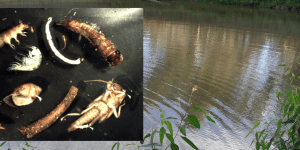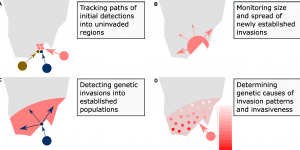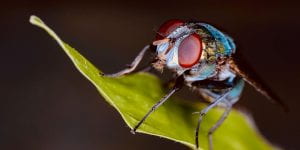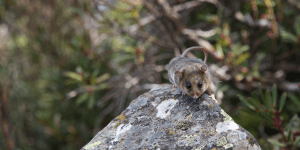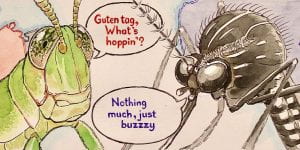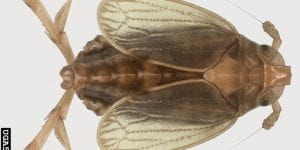Category: Research
-
Finding a common name for the matchstick grasshopper Vandiemenella viatica
Loading…blogs.unimelb.edu.au/pearg/2021/10/20/finding-a-common-name-for-vandiemenella-viatica
-
Improving mosquito control strategies with population genomics
Words: Tom Schmidt When researchers want to investigate evolutionary processes like adaptation and dispersal, they frequently make use of population genomic methods. Population genomics uses DNA data from across an organism’s entire genome – that is, across all of that organism’s DNA. This DNA data can be compared with DNA from other organisms, which can […]blogs.unimelb.edu.au/pearg/2021/06/28/improving-mosquito-control-strategies-with-population-genomics
-
Fly infertility shows we’re underestimating how badly climate change harms animals
Belinda van Heerwaarden, The University of Melbourne and Ary Hoffmann, The University of Melbourne Evidence of declining fertility in humans and wildlife is growing. While chemicals in our environment have been identified as a major cause, our new research shows there’s another looming threat to animal fertility: climate change. We know animals can die when […] -
Variety is the spice of life… and key to saving wildlife
“This article was first published on Pursuit. Read the original article.” Dr Andrew Weeks and Professor Ary Hoffmann In the critical battle against extinction, conservationists use a variety of tactics to try to save species. One of the most fundamental tools is maintaining the amount of variation of genetic material (DNA) in a group of […]blogs.unimelb.edu.au/pearg/2021/06/10/variety-is-the-spice-of-life-and-key-to-saving-wildlife
-
The complexities of predicting climate change effects
This article was first published on Pursuit. Read the original article. Words: Dr James Camac, Nicholas Bell and Professor Ary Hoffmann We currently face significant challenges to accurately predict the impacts of our changing climate on individual species, as well as their ecosystems. A recent report on the demise of an area of snow gums […]blogs.unimelb.edu.au/pearg/2021/03/31/the-complexities-of-predicting-climate-change-effects
-
A self-spreading bacterial infection in an agricultural pest that stops the pest from spreading plant viruses
Words: Ary Hoffmann Banner image: Natasha Wright, licensed under Creative Commons Attribution 3.0 License. In Asia, one of the most damaging pests of rise is the brown planthopper, Nilaparvata lugens. This pest damages plants directly but more importantly it acts as a vector for damaging plant viruses, including the “rice ragged stunt virus” (RRSV). This […] -
The resistance advantage – a field genetic background is important for survival of our Wolbachia mosquitoes in Malaysia and reduction of dengue
Banner image: Nancy with scientists from the Wolbachia dengue program at the Institute for Medical Research, Ministry of Health, Kuala Lumpur, Malaysia. Words and photos: Nancy M. Endersby-Harshman Our paper published two weeks ago in Insects is the result of a research collaboration between PEARG at the University of Melbourne, the Institute for Medical Research […] -
The grasshopper that was lost, then found, is now endangered
This article was first published on Pursuit. Read the original article. By Professor Ary Hoffmann, Vanessa White and Professor Michael Kearney The Key’s Matchstick Grasshopper, or the Keyacris scurra, was once widespread and abundant in New South Wales, the Australian Capital Territory and north-central Victoria, but over the past century its numbers have seriously declined. […]blogs.unimelb.edu.au/pearg/2020/08/21/the-grasshopper-that-was-lost-then-found-is-now-endangered
Number of posts found: 71

